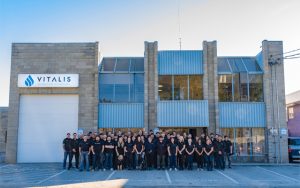While various reports and predictions abound, there is one thing that most who analyze the cannabis industry can agree on: growth is and will continue to be explosive. Fighting against the growth that a newly legal industry with an already-established customer base creates is the mass confusion surrounding an industry that is regulated by a vast patchwork of conflicting laws in the United States.
With the advent of recreational legalization, the market is more settled in Canada, which has led to the emergence of some rather massive corporations, like Canopy and Tilray. But a fast-growing industry also creates other things, like hundreds of smaller, successful companies – as well as a large pile of companies that couldn’t cut it and fell by the wayside.

How do you navigate explosive growth in an uncertain industry that has little when it comes to a blueprint for success? For Joel Sherlock, chairman and co-founder of Vitalis Extraction Technology, the key is innovation.
And the key to continued innovation is communication. “When we look at innovating,” Joel told The Marijuana Times, “it’s really having a diverse client group making a diverse group of products and truly understanding where the pinch points are in the industry, and if we can solve our client’s problems, that’s going to drive our innovation.”
For Joel, the constant feedback he gets from those who use Vitalis equipment tells him where his company needs to go next. When an industry is as new and uncertain as the cannabis industry, the only place to get real-time, usable information is from those who are “on the ground,” so to speak; those who are dealing directly with cannabis consumers, i.e. the market.

This innovation leads to creating the products the market demands, a sure way to success if there ever was one. By focusing on customer service and being more than just an equipment supplier to their customers, Vitalis is able to also be an educator and problem-solver; someone their customers can turn to when they need them, opening up communication channels which flow both ways.
“We’ve been able to evolve into some other equipment as well, pre- and post-extraction, based on some of that feedback,” Joel told us.
Vitalis itself was born out of a problem that needed solving, according to Joel. After investing in various areas of the cannabis industry, he realized that the quality of extraction equipment he was buying wasn’t up to his standards. After efforts to get companies to make the machines Joel needed, he came to another realization: if he wanted the equipment made right, he would have to get it done himself.
So, along with his friends James Seabrook (CTO) and Pete Patterson (COO), Joel set out to do just that by founding Vitalis. “I still want to do this,” Joel said of his thoughts at the time. “James seems passionate about it, his ideas and brain-trust [are] phenomenal, so let’s start a company and make our own.”

Three and a half years later, Vitalis is innovating and leading an industry that is competitive and ever-changing.
Many look at the cannabis industry and see a “gold rush”. They see piles of money just there for the taking. Of course, this draws in tons of investors, and those hordes create the real conditions of the cannabis industry: highly competitive, with small profit margins and a better-than-average chance that you will be replaced tomorrow by a better company or a better idea.
For Joel and the rest of the team at Vitalis, innovation is spurred by a desire to solve problems, make improvements and move the industry forward by leaps and bounds. And they are doing just that.
In the end, the best rise to the top, but if they hesitate in the least they could lose their spot in the market forever. If you’re going to manage growth in the cannabis industry, you must always be ready to adapt to and overcome any obstacle in your way and respond to what the market demands.






